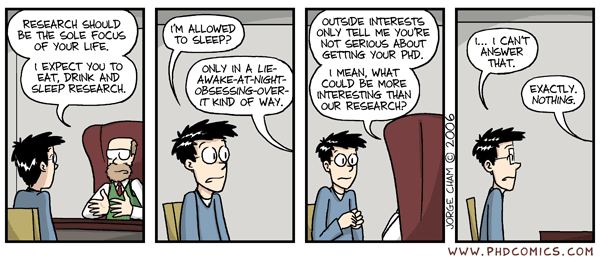I have a PhD: now what? Future-proofing the careers of Australia's research students
27/03/19
Jennifer Boreland has a wealth of experience in higher education student development. She is the Higher Degree by Research student coordinator at the University of Queensland. In this article, an adaptation of Jennifer’s presentation at the 2018 CDAA annual conference, she shares some of the challenges career practitioners can face when working with PhD students, and some of the solutions that she is implementing in her work.

"Piled Higher and Deeper" by Jorge Cham, www.phdcomics.com, with permission
One thing I’ve learned from working with PhD students is that they are somewhat delusional when it comes to their career prospects. I do not mean this unkindly: I mean that many of them hold false or unrealistic beliefs about post-doctoral employment options. Unfortunately, the progression from PhD student to a tenured (‘academic-speak’ for permanent) academic position is no longer a realistic outcome for the majority of these students.
The challenge for universities, and particularly those of us who work in career development within those universities, is to communicate this to PhD students and help them to identify alternative (and potentially more rewarding) career opportunities while equipping them with the relevant skills and abilities to take advantage of these opportunities. As Australia’s Chief Scientist stated earlier this year: “…we need to teach PhDs to leverage new opportunities” (Finkel, 2018) or, in my words, teach them to ‘future-proof’ their careers.
This concept is not new to career development practitioners. A common goal is to help clients obtain long-term, rewarding employment with positive outcomes. However, working with PhD students presents an unusual challenge: PhD students tend not to be focused on careers or career pathways (in part because they think an academic career is a given). Rather they, and those who supervise them, are focused on completing their research.
This focus presents a unique and somewhat challenging environment in which to provide career advice and development opportunities.
The University of Queensland aims to overcome this challenge with the Career Development Framework (CDF), which provides an over-arching structure for career development for PhD students. It seeks to provide an understanding of the diverse range of careers available for PhDs, gives access to networks outside academia, and develops professional skills to ensure students have a competitive edge when entering the workforce.
The CDF is certainly not a perfect tool, but it is gaining traction with both students and supervisors and this is encouraging. Reflecting on the Framework over the last two years I believe there are six key elements which contribute to its increasing impact.
- Starting early
Students are introduced to the CDF during a compulsory Orientation session. Not only do they hear about the Framework and the way it works, they also get to hear from a panel of alumni who talk about their student journey as well as their career pathway following graduation. This early touch-point provides a sound basis for building career development and employment awareness over the course of the degree.
- Painting the landscape
At every opportunity, students are informed about the changing landscape of doctoral employment. This is not in an effort to discourage them: it provides a realistic view and creates an opportunity to introduce them to alternative employment landscapes which are likely to be more sustainable, possibly more interesting, and positively impact the broader Australian community.
- Creating structure
The CDF structures all development opportunities and activities into a number of themes (for example communication, publishing, career planning) which very clearly sit within either Research, Transferrable or Professional skills. In addition, some of the development themes have clearly scaffolded training; where later workshops and experiences build on early, introductory sessions. Feedback confirms that this structure has been extremely helpful for students in making decisions about undertaking development.
- Being relevant
Given the strong focus on research rather than careers, the CDF aims to link development opportunities to the research context as much as possible. All CDF sessions are linked to stages in candidature (that is, linked to different stages of the degree where they are likely to be most relevant). Further, the titles and descriptions of sessions echo research-related language. For example Strategic networking: How to connect for impact has echoes of the importance of research impact (usually measured by publications and citations).
- Being flexible
Some Australian universities have mandated certain courses or the number of hours of career-related development activities for PhD students. UQ has chosen not to take this path in order to take into account the diversity of prior knowledge and experience its research students bring to their degree. This allows for a targeted, specific and intentional approach to development with the result that students who participate are more engaged and more likely to benefit from that engagement.
- Showing empathy
UQ has found that PhD students are far more likely to engage with the CDF when there is an acknowledgement and shared understanding about their PhD experience. For this reason, all facilitators and presenters have experience working with researchers in a research context, many are PhD qualified, alumni are regularly invited to share their experiences with students and there is a PhD qualified careers advisor who provides careers advice and guidance specifically for PhD students.
Any or all of these elements could be implemented in a range of career advising contexts. I have outlined how they look in my context and within the CDF but I believe they could be implemented anywhere. What is am certain of is that we starting to make progress in ‘future-proofing’ the careers our UQ PhD students.
References
Cham, J. (2006, 11th August) Outside Interests. Piled Higher and Deeper Publishing. Retrieved from http://phdcomics.com/comics/
Finkel, A. Doctoral education and impact: The Australian Perspective. Quality in Post-graduate Research Conference. The National Wine Centre of Australia, Adelaide. 17 April, 2018.